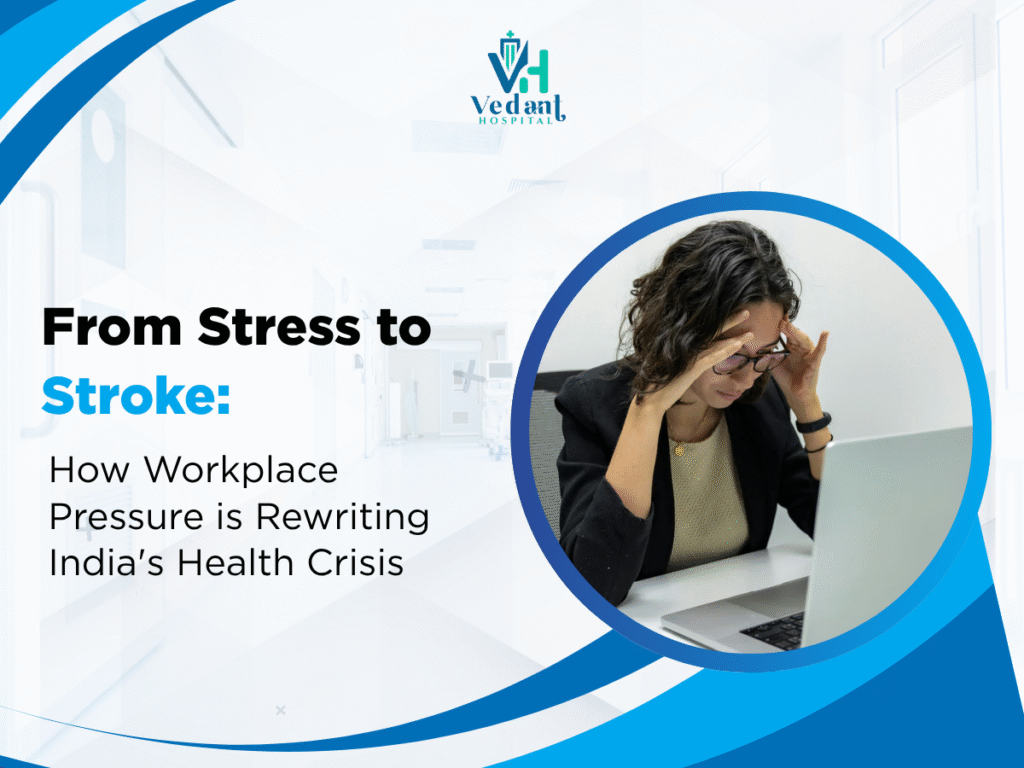In today’s fast-paced world, long work hours, tight deadlines, and constant connectivity have become the norm. But behind the hustle lies a growing and disturbing trend—workplace pressure is rewriting India’s health crisis.
From chronic stress to sudden strokes, the impact of work-related pressure is no longer just mental—it’s deeply physical. In this blog, we explore the connection between work stress and serious health issues, especially in urban India, and how early intervention—even traditional medical approaches—can save lives.
1. The Hidden Toll of Workplace Pressure
How chronic job stress affects your body
Stress at work can go far beyond emotional fatigue. It contributes to:
- High blood pressure (hypertension)
- Elevated blood sugar levels
- Sleep disturbances
- Increased cholesterol
- Risk of stroke and heart attack
2. From Headaches to Strokes: The Dangerous Progression
Recognizing the warning signs before it’s too late
Most workplace stress symptoms are dismissed as minor, but they can escalate:
- Stage 1: Irritability, insomnia, headaches
- Stage 2: Hypertension, digestive issues, burnout
- Stage 3: Diabetes, chronic fatigue, heart disease
- Stage 4: Stroke, heart attack, or brain hemorrhage
Early diagnosis at a reputable hospital in Gwalior can detect elevated stress markers and prevent life-threatening events.
3. How Traditional Medical Interventions Still Save Lives
Why traditional surgery and treatment methods remain essential
In cases of blocked arteries, ruptured vessels, or brain hemorrhages due to stroke, traditional surgery remains the gold standard. Benefits include:
- Immediate access and availability
- Cost-effective treatment plans
- Skilled surgeons with extensive experience
- Trusted for stroke recovery and rehabilitation
Gwalior’s leading multi-specialty hospitals combine modern diagnostics with traditional surgical care, providing a full-circle solution.
4. How to Manage Workplace Stress Before It Manages You
Simple but powerful lifestyle changes
Here’s how you can reduce your risk:
- Take regular short breaks from your desk
- Prioritize 7–8 hours of sleep every night
- Avoid excessive caffeine and processed foods
- Exercise 30 minutes daily (walking, yoga, gym)
- Seek mental health support or counseling when needed
5. Checklist: Should You Be Concerned About Stress-Related Illness?
Tick all that apply:
- I skip meals or eat irregularly
- I experience headaches or chest tightness often
- I feel anxious or irritable most days
- I sleep less than 6 hours regularly
- I’ve had sudden vision, speech, or movement problems
If you checked more than 2, don’t wait. Consult your doctor or visit a hospital in Gwalior for a stress and cardiac health screening.
FAQs: Workplace Stress & Health Risks
Q1. Can work stress really cause a stroke?
Yes. Chronic stress can increase blood pressure and cause clot formation—both leading to stroke.
Q2. What’s the role of traditional surgery in stress-related illnesses?
For conditions like stroke or heart attack, traditional surgical interventions such as bypass surgery or clot removal can be life-saving.
Q3. When should I seek hospital care for stress?
If stress is affecting your blood pressure, sleep, digestion, or you’re experiencing chest pain, visit a hospital in Gwalior immediately.
Conclusion: Stress Isn’t Just in Your Head—It’s in Your Bloodstream
Workplace pressure may feel like “part of life,” but the health consequences can be life-threatening. India’s health crisis is being silently shaped by overworked professionals, and ignoring the symptoms can cost more than your job—it can cost your life.


